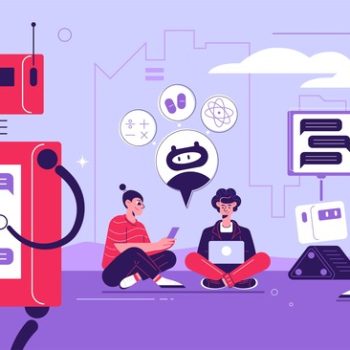In the bustling world of customer service, where speed, personalization, and seamless interactions reign supreme, a new technological powerhouse has emerged to transform the support landscape—Artificial Intelligence (AI). AI effortlessly adapts to the ever-changing needs of customers and businesses alike, revolutionizing the way support is delivered. With AI in customer service and its ability to understand natural language, analyze vast datasets, and predict customer behavior, AI has become the ultimate ally for companies striving to provide unparalleled customer experiences.
Related blog: Navigating the Path of AI-based Customer Helpdesk Software: Challenges, Benefits & Features
According to a recent study, over 67% of consumers believe that AI will provide better customer service in the future.
Gone are the days of tedious support calls and generic email responses; AI has ushered in an era of smart customer service where every interaction feels tailor-made. With each passing day, AI-powered chatbots and virtual assistants grow wiser, learning from their conversations and becoming more intuitive in their responses. From detecting customer sentiments to predicting potential issues before they even arise, AI’s prowess has paved the way for a future where customer service isn’t just efficient—it’s downright extraordinary.
So, let’s explore ten examples of AI in customer service and uncover how these innovative applications are redefining the support landscape.
10 Examples of AI in Customer Service
1) AI Chatbots for Instant Assistance
AI-powered chatbots are at the forefront of customer service automation. These virtual assistants engage with customers in real-time, offering instant solutions to frequently asked questions, product inquiries, and troubleshooting. With natural language processing (NLP) capabilities, chatbots provide human-like interactions, ensuring a seamless and personalized support experience.
Chatbots can handle a wide range of queries and tasks, from tracking order status to providing technical support. By integrating with a knowledge base, they continuously learn from interactions, improving their responses over time. Moreover, chatbots operate 24/7, ensuring that customers receive prompt assistance regardless of the time or day. By automating routine tasks, chatbots free up human agents to focus on complex issues, leading to increased efficiency and productivity in the support team.
2) Virtual Customer Assistants for Personalization
Virtual Customer Assistants (VCAs) utilize generative AI in customer service to create personalized interactions. These intelligent systems analyze customer data, preferences, and history to offer tailored recommendations, product suggestions, and proactive support, thereby enhancing customer satisfaction and loyalty.
VCAs can engage customers across multiple channels, such as website chats, mobile apps, and voice interfaces. Through continuous learning, they gain insights into customer preferences and behaviors, allowing them to anticipate needs and offer targeted assistance. With personalized interactions, VCAs foster a sense of familiarity and connection, strengthening the customer-business relationship. This results in higher customer retention rates and increased revenue through upselling and cross-selling opportunities.
3) Sentiment Analysis for Customer Insights
AI-driven sentiment analysis tools analyze customer interactions to gauge emotional responses. By deciphering sentiments behind conversations, businesses can identify potential issues, address customer pain points, and offer empathetic responses, ultimately fostering stronger relationships.

Sentiment analysis helps businesses monitor customer satisfaction levels and detect early signs of dissatisfaction. When negative sentiments are detected, support teams can intervene promptly and offer solutions to resolve customer concerns. Additionally, sentiment analysis provides valuable feedback for product and service improvements, ensuring that businesses stay in tune with customer needs and expectations.
4) Predictive Analytics for Proactive Support
AI-powered predictive analytics leverages historical data and customer behavior patterns to anticipate potential issues. By detecting trends and patterns, businesses can resolve problems before they escalate, thus providing proactive support and increasing customer loyalty.

Predictive analytics can identify patterns in support tickets and customer interactions that lead to escalations. By addressing these issues proactively, businesses can reduce the number of support requests and ensure a smoother customer experience.
Moreover, predictive analytics aids in resource allocation, allowing support teams to prioritize tasks based on the likelihood of escalation, leading to better time management and resource optimization.
5) Speech Recognition for Enhanced Call Center Operations
AI-based speech recognition technology enhances call center efficiency by automatically transcribing and analyzing customer calls. This tool ensures accurate data collection, enables real-time monitoring, and facilitates the identification of areas for improvement.
Speech recognition in call centers eliminates the need for manual note-taking during customer calls, allowing agents to focus entirely on addressing customer concerns. It also assists in quality assurance, enabling supervisors to review call transcripts and provide feedback to improve agent performance. Furthermore, speech recognition aids in compliance monitoring, ensuring that agents adhere to standard protocols and guidelines during customer interactions.
6) Natural Language Understanding for Advanced Ticketing
AI’s natural language understanding capabilities streamline ticketing processes. By categorizing and prioritizing support tickets based on customer inquiries, businesses can optimize response times and route issues to the most suitable agents or bots for resolution.
Natural language understanding (NLU) enables AI systems to comprehend the intent and context behind customer queries, avoiding generic responses and ensuring relevant solutions. By automatically routing tickets to specialized agents or appropriate departments, NLU facilitates faster resolution and prevents unnecessary escalations.
As a result, customers experience quicker issue resolution, leading to higher satisfaction levels.
7) AI-Powered Email Automation
Handling large volumes of customer emails can be overwhelming. AI-driven email automation processes and responds to incoming emails based on predefined rules and customer history, reducing response times and enhancing the overall support experience.

Email automation utilizes AI algorithms to categorize emails and respond with appropriate templates or customized responses. This significantly reduces the time and effort required for manual email management, allowing support teams to address customer inquiries more efficiently. AI-powered email automation also ensures consistency in responses, maintaining a high level of customer service across all interactions.
8) Visual Recognition for Product Support
Generative AI in customer service extends to visual recognition technology. By analyzing images and videos, AI can identify product issues, guide customers through troubleshooting, and provide step-by-step visual instructions, simplifying support interactions.
Visual recognition technology allows customers to provide evidence of product defects or issues through images or videos, eliminating the need for lengthy explanations. AI can then analyze the visuals and offer relevant solutions or guide customers through the necessary troubleshooting steps.
This reduces the time and effort required to resolve complex product-related problems and enhances the customer’s understanding of the solutions provided.
9) Virtual Product Demonstrations
AI-powered virtual product demonstrations provide interactive experiences for customers, allowing them to explore products virtually. This technology helps customers make informed purchasing decisions and reduces the need for physical product demonstrations.
Virtual product demonstrations enable customers to visualize and interact with products in a virtual environment. By showcasing product features and functionalities in an engaging manner, businesses can capture customer interest and drive sales. Virtual demonstrations also provide a more immersive experience, enhancing customer satisfaction and reducing the need for physical product testing.
10) AI in Social Media Monitoring
Social media platforms are vital channels for customer interactions. AI-driven social media monitoring tools track mentions, comments, and sentiment trends across platforms enabling businesses to promptly respond to customer inquiries and resolve issues.
AI-powered social media monitoring tools analyze vast amounts of social media data in real-time, allowing businesses to stay updated on customer sentiments and conversations. By responding promptly to customer queries and addressing issues publicly, companies can demonstrate their commitment to customer satisfaction and improve their brand reputation. AI also aids in identifying influencers and brand advocates, allowing businesses to nurture relationships with influential customers.
Related blog: Most Effective Ways to Use Generative AI in Customer Service
Final Thoughts
The integration of AI in customer service has proven to be a game-changer for businesses, empowering them to offer seamless and efficient support experiences. With 67% of consumers expecting AI-driven improvements in the future, it’s evident that AI will continue to play a pivotal role in customer service. By utilizing AI chatbots, virtual customer assistants, sentiment analysis, predictive analytics, and more, businesses can elevate their support services to new heights, strengthen customer relationships, and stay ahead in the competitive market.
The future of AI in customer service holds tremendous potential, as advancements in generative AI technology promise even more sophisticated applications. As AI continues to evolve, businesses must embrace these innovative tools to stay at the forefront of customer service excellence. By leveraging the power of AI, companies can foster more meaningful interactions, exceed customer expectations, and establish themselves as leaders in the customer-centric landscape


















